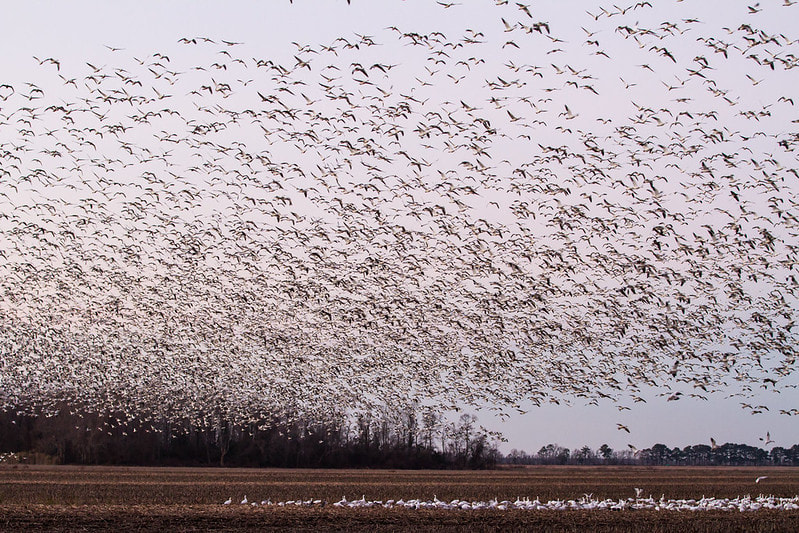|
READ the following statement for Southern Conservation Partners authored by board chair Milo Pyne. . . . In addition, we recommend this Aug. 20, 2020 INTERVIEW with J. Drew Lanham (Clemson University wildlife ecology professor; author of numerous profound essays concerning environmental justice and issues for minority populations in America; and author of books including The Home Place: Memoirs of a Colored Man's Love Affair With Nature and 9 Rules for the Black Birdwatcher. The interview was conducted by Tom Fleischner, Natural History Institute executive director and chair of the Ecological Society of America's natural history section. ___________ "Friday, June 19th, was Juneteenth, an annual celebration commemorating the end of slavery in the United States. To honor this solemn anniversary and to demand continued work toward true liberation for black people in this country, hundreds of thousands of people took to the streets in a national day of action organized by Black-led groups on the front lines of this fight. We will continue to remember ... George Floyd Breonna Taylor Ahmaud Arbery Rem'mie Fells Sandra Bland Rekia Boyd Trayvon Martin Riah Milton Tony McDade Rayshard Brooks Oluwatoyin Salau … and countless other Black lives lost to police brutality and racist violence. We at Southern Conservation Partners must sadly acknowledge that the conservation lands forming the backbone of land and biodiversity conservation in the southeastern United States were first stolen from the indigenous inhabitants—members of civilizations and groups we now call the Cherokee, Lumbee, Shawnee, Choctaw, Natchez, Yuchi, Eno, Caddo, Timucua, Catawba, Seminole, and many more. Their names live on in the terms by which we describe many of our rivers, National Forests, and other conservation lands. (continued...) These lands were then worked by enslaved African people and subsequently by Black people under conditions of near-servitude (share-cropping, debt peonage). We must be clear that their labor shaped the landscapes in which we work. These include South Carolina rice and cotton plantations, the rich fields of the Black Belt, and the vast longleaf pine forests from which Black workers extracted pitch and tar in what must have been extremely difficult and disagreeable work.
We must also acknowledge that over generations, independent Black farming families have been systematically deprived of their land and that this process continues to this day. The phenomenon of “heirs’ property” contributes to the difficulties that black families have in retaining rights to their land. We need to continue to help the land trust community understand these issues and reach out to black farmers and work with them to retain or gain access to land. Our recent partnership with the EarthSeed Land Collective is one example of this type of relationship that we would like to expand upon. We agree with The Network for Landscape Conservation, whose statement acknowledges and condemns “the systemic anti-black racism and injustice that has pervaded our country for 400 years . . .” and, like them, we “acknowledge the racist roots of the conservation movement itself” and that it “has too often ignored or trampled the voices, needs, and rights of People of Color and Indigenous communities on the landscape with tragic consequences —and made people feel unwelcome and unsafe like Christian Cooper while birding in Central Park.” We support the Network’s call for “concerted action and societal change.” We also want to second the sentiments of the iNaturalist blog, which states, “We believe that nature is for everyone. Biodiversity is for everyone. Curiosity and exploration are for everyone. Everyone should be able to be in nature without fear of discrimination. Unfortunately, recent events in the United States have reminded us that enjoying the outdoors carries much greater risks for Black people like Christian Cooper, who had the police called on him while birding, or Ahmaud Arbery, who was chased down and murdered while jogging. We stand for the safety and the right of Black people to be outdoors and in nature without being subject to suspicion, confrontation, or the threat of violence.” We hope to join with others in the broader conservation movement who feel these same concerns and who will act on these needs. We seek to have frank and honest discussions about privilege and power, racism in conservation, the need to decolonize conservation, and other related concerns—and to learn from our colleagues and friends who can speak from their lifetimes of personal experience and perspective." --Milo Pyne, Board Chair, for Southern Conservation Partners
2 Comments
I’m here to appreciate you work This blog is very helpful for me. It’s such a beneficial for visitors. All of our products have designed to be used for Novelty, Education and Entertainment purposes only.
Reply
Leave a Reply. |
When we see land as a community to which we belong, we may begin to use it with love and respect.... Conservation, viewed in its entirety, is the slow and laborious unfolding of a new relationship between people and land." There is in fact no distinction between the fate of the land and the fate of the people. When one is abused, the other suffers. From the PresidentSCP President Chuck Roe looked at land conservation along the route of John Muir's "Southern Trek." About ViewpointThis blog offers views of our Board and partners. We invite your viewpoint on the following questions: Archives
April 2024
Categories
All
|


 RSS Feed
RSS Feed